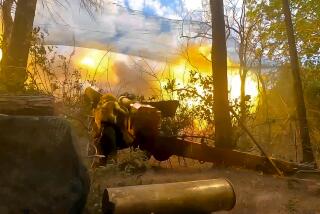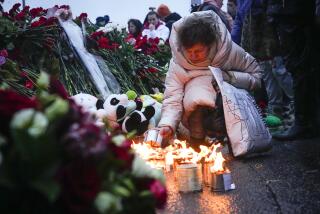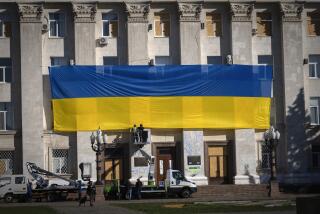Symbolic Chechnya Palace Falls to Russians
GROZNY, Russia — Chechnya’s presidential palace, symbol and nerve center of the tiny Muslim republic’s secessionist rebellion against Moscow, fell to overwhelming Russian firepower Thursday after a 20-day siege.
Chechen fighters abandoned the charred, smoking 10-story building after bombs smashed into their basement bunker Wednesday night. Between midnight and 3 a.m., they said, they removed their dead, their wounded and about 200 Russian prisoners to a new command center in this capital.
Russian soldiers moved in later, and by afternoon they had hoisted their flag.
President Boris N. Yeltsin, who provoked a political crisis in Moscow by launching thousands of troops into the unpopular and costly war in Chechnya on Dec. 11, declared the military campaign “effectively over.”
But Chechnya’s defense minister, Col. Aslan Maskhayev, said the battle for Grozny was continuing.
“I can’t see any difference between yesterday and today,” he told reporters Thursday night. “Our headquarters is set up and the fighters are in their new positions. We’re ready to carry on with our fight for freedom.”
The fall of the palace, which struck other Chechens as a demoralizing blow, opens a new, uncertain phase of the conflict.
It forces the rebels to choose between fighting for Grozny block by block or retreating to the surrounding countryside and Caucasus mountains to defend their home villages.
In either case, the Russians can react with the same long-distance bombing and artillery fire that destroyed the palace or pursue the rebels with Moscow’s so-far reluctant ground forces.
They may have to do without the army. Yeltsin said Interior Ministry troops would be left with “the subsequent mission to restore law, order and civil rights” in the unruly republic 1,000 miles south of the Russian capital.
And the Kremlin’s claim of victory could stiffen already strong resistance among Russian soldiers here to getting involved in the prolonged guerrilla conflict that may now develop.
A marine officer interviewed in Chechnya for Russian television Thursday said: “We don’t feel very cozy here. Some of us are frightened, but we are going to hold on. We are waiting for our leaders to pull us out. Being here is not right.”
The war, Moscow’s biggest since the 10-year Soviet occupation of Afghanistan, has thrown tens of thousands of Russian troops against a few thousand Chechen irregulars.
It was plagued from the start by disobedience, desertions, technical unpreparedness and the unexpectedly fierce resistance of mountain people with a 300-year history of blood feuds with the Kremlin.
Untold thousands have been killed, and a third of Chechnya’s 1.2 million people have been made homeless. Moscow admits 1,160 Russian soldiers killed, and unofficial estimates are much higher. Russian officials said the war and the postwar reconstruction of Connecticut-sized Chechnya could cost as much as $4.5 billion.
*
The brutality of the Russian campaign, especially the air strikes on Grozny and other populated centers, shattered Yeltsin’s reputation in the West as a reform democrat and cost him the support of most of his former political allies at home.
Thursday’s dramatic turn in the war could help the 63-year-old Russian leader repair this political damage and put Chechnya behind him. If he is unable to sell Chechnya as a victory, he must portray it convincingly as a conflict that is quickly winding down.
With Russia’s news media so unfettered, however, that will be a hard sell, even among Yeltsin’s few allies in Moscow.
“Things don’t get done that quickly in the Caucasus,” Ramazan Abdulatipov, deputy chairman of the upper house of Russia’s Parliament, told Russian television Thursday. “In this case, we have been mired in a very deep conflict, and it will take us very long to get out of it.”
The whereabouts of Gen. Dzhokar M. Dudayev, the Chechen president who declared independence three years ago, were unclear Thursday night. He left the palace before Russia laid siege to it New Year’s Eve and was last seen in public a week ago.
But Dudayev’s leadership has proven almost irrelevant in this war, which has rallied most of his domestic political foes against the Russian assault.
Chechen fighters interviewed inside and outside Grozny said they will wage armed resistance wherever the Russians pursue them or try to establish political control. But they said there is no point in trying to retake the palace.
“Why? It’s just a skeleton,” Aindi Beksultanov, a Chechen fighter in Grozny, told the Associated Press. “We won’t fight for buildings anymore. We won’t have any particular base. We’ll be moving around the city.”
Maskhayev, the Chechen defense minister, said his fighters abandoned the palace after he rejected an ultimatum Wednesday from a Russian commander, Gen. Ivan Babichev, to surrender.
“It was insulting for me, and I swore at him,” Maskhayev told reporters Thursday night in the neighboring republic of Ingushetia. “But he offered to keep talking” and later offered a temporary cease-fire.
“It’s easy for you because you have a regular army and you can give an order and all your units will obey,” Maskhayev said he replied. “It’s much harder for me because, besides the Chechen army, we have fighters from villages here, we have people seeking blood revenge. We even have people here who are fighting alone. We can’t control them, but I can promise that by midnight, we’ll stop our heavy weapons and tanks.”
He said Babichev called back and insisted on capitulation, whereupon Maskhayev refused and hung up.
After nightfall Wednesday, amid one of the city’s most punishing artillery barrages of the war, four powerful “penetration bombs” smashed into the palace’s heavily fortified basement, Maskhayev said, prompting the defenders to leave. Other Chechens said the defenders suffered dozens of casualties in the bombing but met no resistance as they abandoned the palace.
Maskhayev said his men moved their headquarters across the Sunzha River about half a mile to the south.
From a ridge on the city’s edge Thursday night, reporters saw that general area of southern Grozny ablaze from Russian air and artillery attacks. Pale yellow flares rose periodically in the orange glow of flames to illuminate Russian targets. Part of the ruined palace also appeared to be on fire.
More to Read
Sign up for Essential California
The most important California stories and recommendations in your inbox every morning.
You may occasionally receive promotional content from the Los Angeles Times.










